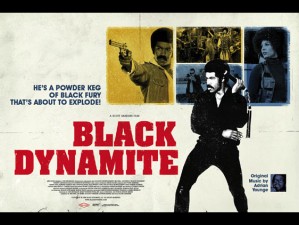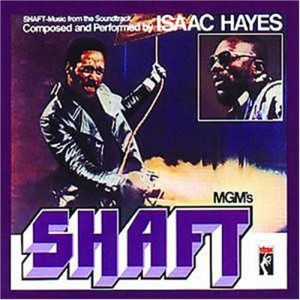 Much the same way that Quentin Tarantino and Robert Rodriguez mimicked 1970s B-movies in Grindhouse, the new Black Dynamite takes pains to evoke the classic blaxploitation film, down to the soundtrack. Waxpoetics has released two CDs to accompany Black Dynamite – one of soundtrack music composed and performed by Adrian Younge, and one of library music recorded in the ’70s and used in the film. Younge takes care to recreate the sound of the era, not just in the wah-wah’ed funk guitar, the bank of foxy vocalists and the soul-jazz flute, but down to details like the snare sound and the slightly muted sound that accompanied soundtracks recorded in mediocre studios.
Much the same way that Quentin Tarantino and Robert Rodriguez mimicked 1970s B-movies in Grindhouse, the new Black Dynamite takes pains to evoke the classic blaxploitation film, down to the soundtrack. Waxpoetics has released two CDs to accompany Black Dynamite – one of soundtrack music composed and performed by Adrian Younge, and one of library music recorded in the ’70s and used in the film. Younge takes care to recreate the sound of the era, not just in the wah-wah’ed funk guitar, the bank of foxy vocalists and the soul-jazz flute, but down to details like the snare sound and the slightly muted sound that accompanied soundtracks recorded in mediocre studios.
Younge effectively internalizes the values of blaxploitation soundtracks, which put a premium on atmosphere. They sound progressive, even while the movies they accompanied told the oldest stories in the world in cliched, exploitative ways. Some of the great soul artists of the ’60s and ’70s made blaxploitation soundtracks and, like Younge, were evocative without being particularly memorable. Willie Hutch’s The Mack and Foxy Brown are exceptions, with great instrumental and vocal tracks, but too often, the efforts made to make music that fit into a visual narrative produced generic tunesmithing. The irony in this case is that Younge’s doing so intentionally in homage to his forerunners’ shaky efforts, and unlike some similar efforts, he never breaks face and gives his game away. If you didn’t know Black Dynamite was released this year, you’d think its soundtrack was of classic vintage. And his songs, like songs by Bobby Womack, James Brown and countless others, share an urbane jazz-funkiness that’s hard to deny.
The library music disc echoes with greater richness and greater transparency because it was made to be faceless. It was music recorded in the ’60s and ’70s by musicians who in effect created a library of music snippets that filmmakers with limited budgets could use instead of paying to have a unique soundtrack composed, performed and recorded. For those who fetishize the sounds of soul-jazz, albums of library music are pirate treasure because the best tracks capitalize on the mood-establishing properties of a breathy flute, a Fender Rhodes playing a minor key blues, or the dramatic sizzle of a pattern played on a barely opened hi-hat.
 These albums arrived in the office within days of a reissue of Shaft on Concord Records, and their existence is a tribute to Isaac Hayes’ genius. There are few ideas in Black Dynamite or the other blaxploitation soundtracks that aren’t test-driven or pointed to by the Shaft soundtrack in 1971. For years, I’ve been arguing that Truck Turner is the great Hayes soundtrack, and I’ll stand by the premise that a number of tracks on that album are more dynamic than anything on Shaft. But listening to Shaft again a few years removed from the height of my blaxploitation soundtrack obsession, I now hear Hayes as fully engaged in not just the sounds of instruments but the details of performances and the subtle ways compositions grow more complex without reaching beyond their soundtrack raison d’etre. A percussion part that enters midway through the piece gives it additional urgency without breaking the mood, and pieces add layers to the scenes they’re to accompany. “Ellie’s Love Theme” has a surprisingly optimistic, empowered vibe, and the initial notes of danger in “Shaft’s Cab Ride” give way to sassy horn-driven R&B strut that ends abruptly, the final notes being a few hammered-on guitar notes that feel like a woozy denoument to a wild ride.
These albums arrived in the office within days of a reissue of Shaft on Concord Records, and their existence is a tribute to Isaac Hayes’ genius. There are few ideas in Black Dynamite or the other blaxploitation soundtracks that aren’t test-driven or pointed to by the Shaft soundtrack in 1971. For years, I’ve been arguing that Truck Turner is the great Hayes soundtrack, and I’ll stand by the premise that a number of tracks on that album are more dynamic than anything on Shaft. But listening to Shaft again a few years removed from the height of my blaxploitation soundtrack obsession, I now hear Hayes as fully engaged in not just the sounds of instruments but the details of performances and the subtle ways compositions grow more complex without reaching beyond their soundtrack raison d’etre. A percussion part that enters midway through the piece gives it additional urgency without breaking the mood, and pieces add layers to the scenes they’re to accompany. “Ellie’s Love Theme” has a surprisingly optimistic, empowered vibe, and the initial notes of danger in “Shaft’s Cab Ride” give way to sassy horn-driven R&B strut that ends abruptly, the final notes being a few hammered-on guitar notes that feel like a woozy denoument to a wild ride.
Listening to Shaft again, it’s suddenly clear that after a year or so spent hunting blaxploitation soundtracks down, I really only needed a few more – the Willie Hutch soundtracks and Across 110th Street – after Hayes’ classic.




